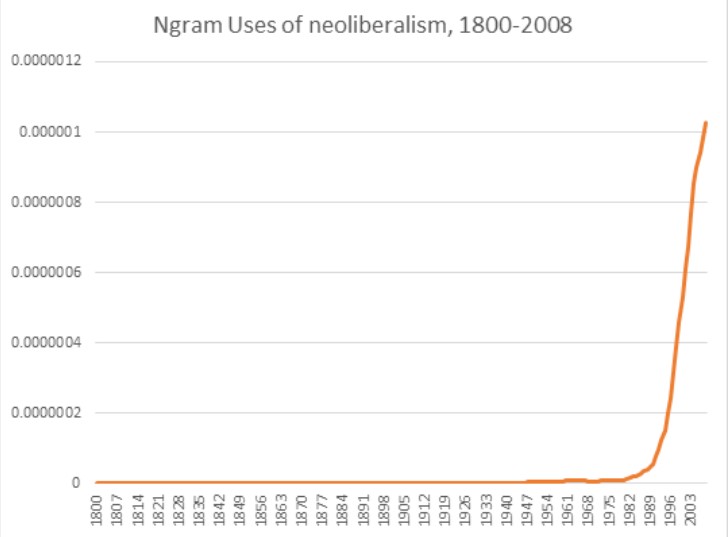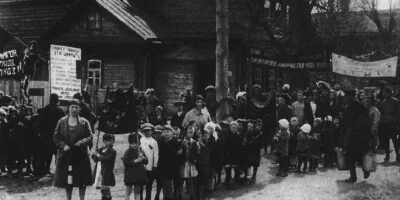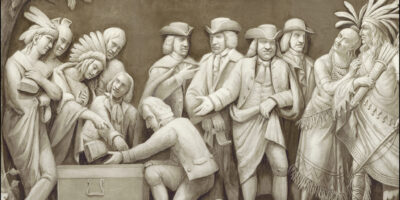The Pejorative Origins of the Term “Neoliberalism”
The term “neoliberalism” is probably the trendiest scapegoat in intellectual circles at the moment. It refers to a purported ideological movement that bears blame for a variety of progressive grievances about the world today: inequality, poverty, climate change, deregulation, globalization, and the proliferation of money in politics. This “neoliberal” ideology also holds higher education captive, inflicting faculty-size stagnation, administrative bloat, and expanding student debt onto the universities at the expense of “faculty governance.”
While many of these alleged problems are tenuously demonstrated at best, to large swaths of the academic and intellectual elite there is no doubt that “neoliberalism” is their source. This moniker makes for a very strange diagnosis though, as almost no self-identified adherents of neoliberalism exist (and the very few that do are almost all attempting to appropriate the term from the political left’s derogatory deployment).
For a movement with next to zero actual claimants, neoliberalism attracts an inordinate amount of scorn, much of it viciously profane and spiteful. Even more curious, the term only entered the common academic lexicon in the last 30 years.
Academia’s Favorite Conspiracy Theory
So how did a term that almost nobody used until 1990 become the target of academia’s favorite conspiracy theory on all of the problems in the world, real and imagined? The most commonly encountered version of the story links the word “neoliberal” to a small group of free market economists around Ludwig von Mises and F.A. Hayek in the decades between the two world wars.
According to this standard narrative, the term originates from a small academic conference held in Paris in 1938, now referred to as the Walter Lippmann Colloquium. In addition to its namesake, the American political columnist Walter Lippmann, the meeting’s attendees included Mises, Hayek, and an assortment of other European intellectuals who generally hailed from the classical liberal political tradition. The Colloquium is widely regarded as the birthplace of neoliberalism in the scholarly literature. Aside from the history of economic thought, hundreds of published works now repeat as established fact that this 1938 conference actually coined the term. Although not their exclusive domain, this historical account is especially common in present day Marxist and Critical Theory attacks on “neoliberalism” itself.
The internal politics of the Colloquium are fascinating and complex. They also complicate the term’s modern-day association with free markets. Facing a crisis of method that stemmed from the Great Depression and the rise of fascism in Europe, some attendees proposed abandoning the laissez-faire precepts of classical liberalism and inviting an increased role for government as an institutional stabilizer of the economy through its ebbs and flows.
The proposed shift entailed acquiescence to a fiscally disciplined but active role for the state in the economy. To avoid relegation to political oblivion amid the threats of the Depression era, according to the proposal, classical liberals must show their willingness to indulge in public works spending, adopt a greater tolerance for redistributive taxation, and admit a role for the state in establishing and guiding economic institutions. Supporters of this strategy, led by colloquium participants Louis Rougier and Alexander Rüstow, proposed a new name for their intellectual movement: neoliberalism.
The moniker proved controversial from the moment of its introduction, and the faction of attendees associated with Mises rejected this abandonment of economic non-intervention. As Richard Ebeling has shown, this variant of the term “neoliberal” was wedded to economic planning from the outset.
While some of the French and German delegates briefly turned to the moniker after the Second World War, it never really caught on in the mainline of classical liberal thought. The Austrians associated with Mises rejected it, and its closest intellectual descendant today is not to be found among economic libertarians of the United States but rather the comparatively narrow and less-known Ordoliberal school, which emerged in mid-century Germany. The Ordoliberals today still operate under the broader classical liberal umbrella, but mainly as a variation down the route not taken by the Misesian mainline.
Curiously, most academic applications of the term “neoliberal” today nonetheless attempt to link it to Mises, Hayek, and the many American derivatives of the Austrian school. They portray neoliberalism as an undemocratic sort of laissez-faire ideology with “property rights supremacy,” wherein the masses are denied their ability to collectively appropriate wealth from its owners through the ballot box. The term is accordingly deployed to describe the rejection of state intervention in economic affairs, or precisely the opposite of the concessions that the Ordoliberals made at mid-century.
The Mises-Hayek origin story of neoliberalism is pervasive in the academic literature. Elaborate histories purport to trace its lineage from the Hapsburg Empire of early 20th-century Vienna to the World Trade Organization today, always by way of the Walter Lippmann Colloquium. Other works adapt this narrative to their own modern political causes, crediting the events of 1938 with spawning a “neoliberal thought collective” that supposedly became the main culprit for the 2007–8 financial crisis and, in their telling, still dominates economic policy making today.
Much of the term’s recent popularization appears to trace to the 1978–79 lectures of French philosopher Michel Foucault, who ironically did not adopt the overwhelmingly pejorative connotation of its modern uses. Foucault did however popularize the Walter Lippmann Colloquium as a central moment of its origin story.
Referring to the French-language transcripts of the 1938 proceedings, Foucault noted that “in the course of this colloquium the specific propositions peculiar to neo-liberalism are defined.… In all the texts of the neo-liberals you find the theme that government is active, vigilant, and intervening in a liberal regime.” This distinctive view broke from laissez-faire precepts, Foucault acknowledged, and also imbued “neoliberalism” with a form of political agency — thus the view’s modern reputation as supportive of proactive governance on behalf of free markets.
Even as Foucault remained infamously ambiguous about the nature of neoliberal governance, his followers in successive decades have not. The current norm thus treats neoliberalism as a global poltergeist, a malicious entity of conscious design that wields power advantageously and wreaks havoc and destruction upon the marginalized persons of the world for its own gain. Thus we arrive at the conspiratorial core of the present day’s grievance.
An Alternative Etymology
Aside from its politicized deployment, a recurring problem with the modern neoliberalism literature is that it has settled upon a deeply confused and partial origin story for the term. This much was already evident in Mises’ rejection of Rougier and Rüstow’s proposed retreat from laissez-faire nonintervention in 1938. As a result, modern uses almost unwittingly embrace a historical contradiction. The term is today much more heavily associated with the Misesian tradition that refused it in 1938 than its actual claimants from the same gathering, who are comparatively obscure.
Even more fundamentally, the Walter Lippmann Colloquium is also an erroneously identified and retrofitted beginning for the label.
To find neoliberalism’s actual origins, we must turn the clock back by over a decade to the intellectual scene of 1920s Vienna and, with it, neglected sources in the German language. In doing so, we quickly find that “neoliberalism” first emerged as a political label for economic liberalism as applied by its critics on the far left and far right of the interwar European intellectual scene (a handful of 19th-century uses predate this deployment, but with different definitions that do not map onto the current term).
In this earlier use, first dating to around 1922, the term neoliberalismus or neuliberalismus was coined to designate practitioners of free market economics who modified its classical precepts not by rejecting laissez-faire, but rather by adopting marginalism in their analysis and with it, crucially, a marginal theory of valuation that directly challenged Marxist labor-theory dogma. These earlier designations often used the term to describe the Viennese thinkers associated with Mises, who was seen as the “neoliberals’” champion.
One early example appears in a footnote from Max Adler’s 1922 book Die Staatsauffassung des Marxismus. Adler was an avowed communist and associate of Rudolf Hilferding, the Marxist theorist-turned-politician who engaged in a decades-long debate with the Austrians over the nature and feasibility of centralized planning. The Austro-Marxist school of Adler and Hilferding was notable for attempting a succession of rejoinders to Eugen von Boehm-Bawerk’s devastating critique of Marx’s labor theory of value, first published in 1898.
In 1922, Adler named Mises’ recently published Nation, State, and Economy (1919) as exemplifying “der neueren und eifervollsten des Neoliberalismus” — essentially the most zealous articulation of “neoliberalism” to date. Adler treated the concept pejoratively, and regarded Mises’ effort as a politically driven response to the ascendance of his own brand of Marxian socialism. Adler conveniently accepted his socialist position as a historically demonstrated truism and accordingly saw Mises as attempting to breathe life into what he saw as a failing capitalist status quo.
Two years later, Hilferding commissioned Alfred Meusel, a Marxist colleague, to pen a lengthy critique titled “Der Neu-Liberalismus” for his magazine Die Gesellschaft, one of the main political organs of the Austro-Marxists. Meusel’s article specifically targeted Mises’ 1922 book Socialism, which investigated the intractable obstacles that afflict central planning as a result of the socialists’ destruction of a functional allocation mechanism.
To the historian Meusel, Mises’ “neoliberal” alternative to socialism amounted to a utopian scheme that he regarded as unsuited for the “realities” of Marxian labor struggle, the latter also accepted as a truism. Like Adler, he conveniently claimed the weight of history as a reason to cast aside Mises’ criticisms. A labor uprising was to be a political certainty, and the Marxists claimed to possess the tools to accommodate it. Similar themes would characterize Meusel’s sparring with Mises in German-language journals and magazines for the next decade.
Just two years after Meusel’s adoption of the term in Die Gesellschaft, another of Mises’ intellectual adversaries attempted to map out a distinct “neoliberal” school of economics as part of a revision to the adversary’s widely circulating German-language textbook on the history of economic thought. But this time the critique came from the political far right in the form of social theorist Othmar Spann.
Spann is best-known today as a proto-fascist philosopher who championed a German collective identity and a radical repudiation of 19th-century liberalism. He was also a central figure in the academic politics of the University of Vienna as well as a frequent rival of Mises on the faculty (Mises would write a blistering attack on Spann’s critique of marginal valuation in his 1933 book Epistemological Problems in Economics).
In his 1926 textbook revision (later translated to English in 1931), Spann added a new chapter on what he dubbed the “neoliberal trend” (or “school” in the original version) in economics. He presented this development as an effort to resuscitate the “Ricardian school,” or essentially classical economics, from its death at the hands of its critics.
Like his Marxist contemporaries, Spann was bitterly hostile to the object of his labeling and designated it pejoratively. The very existence of a “neoliberal” movement and “the fact that this school should recently have become dominant,” he groused, “are manifest indications that our science is still talking the language of the eighteenth century.”
Spann’s taxonomy attempted to formally define the “neoliberal” schools of thought. As with the Marxists, he immediately extended the moniker to “the marginal utility school” in an unelaborated reference to his Viennese colleagues. But he also linked the term to the contemporary Stockholm school of Knut Wicksell and Gustav Cassel, treating such economists as parallel expositors of a modernization of classical precepts amid their anti-liberal critics (Cassel rejected marginal valuation and posited his own theory of pricing derived from scarcity and comparative price levels across countries).
Spann further associated “neoliberalism,” in its many geographical components, with the methodological individualism that his own “universalist” system sought to purge from economic and social theory. To Spann, liberalism’s great failing was its individualism, which he saw as an exercise in denial of a natural and spiritual national community.
Although an anti-Marxist himself who rejected Marx’s “surplus value” solution to economic valuation as “theoretically unsound,” Spann effusively praised Marx’s “good service by drawing attention to the inequality of the treatment meted out to worker and to entrepreneur respectively in the individualist order of society.”
The collectivist dispositions of these two camps, far right and far left, made individualist liberalism a common enemy under their shared pejorative label “neoliberalism.”
The Return of the “Neoliberal” Label
While Mises himself appears to have left very little that would indicate what he thought of this label, its adoption by several of his most vocal opponents, right and left, in the early 1920s may be easily established by the works of Adler, Meusel, and Spann. It is not difficult to see how these earlier uses may have weighed on his mind in 1938 when the other Lippmann Colloquium attendees proposed the term and associated it with a shift toward greater state economic intervention.
Curiously, the pejorative use of the 1920s continues to have much in common with the deployment of the “neoliberal” label that we see all around us today. While some modern “neoliberalism” critics do target what might be better designated as an Ordoliberal-style melding of market liberalism with a fiscally disciplined social safety net, the classical liberal positions of deregulation, free trade, and above all laissez-faire remain the far more common target.
Yet also hovering just beneath the surface in these uses are a number of familiar concepts from Mises’ 1920s adversaries: an almost-axiomatic valorization of labor, a rejection of marginalism and its derivative theory of value, and a belief in the collective identity struggles that typify both classical-Marxist and modern critical-theory approaches to social analysis. The “neoliberal” label, it seems, never shed its original pejorative political purpose.












